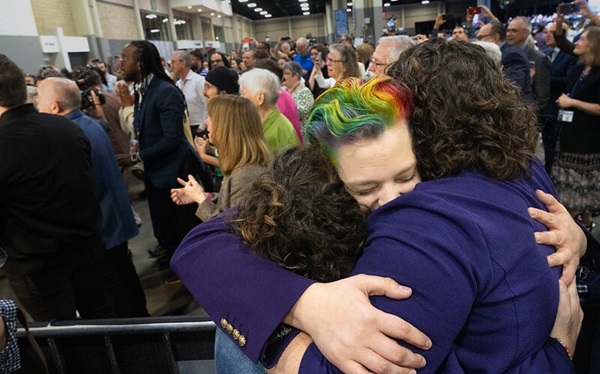“Open Hearts. Open Minds. Open Doors.”
For a couple of decades, The United Methodist Church utilized this as a tagline. Though, in the years immediately leading up to 2024, it might be a little tough to find that tagline in official marketing pieces. The reality is the tagline felt disingenuous to a fair number of United Methodists who felt the denomination’s policies regarding LGBTQ+ clergy and same-sex weddings to be closed-hearted and closed-minded.
The General Conference is a legislative body which meets once every four years–although the COVID pandemic interrupted that four-year cycle. The General Conference is the only body authorized to speak on behalf of the United Methodist denomination. It is comprised of elected delegates from across United Methodism’s worldwide connection and holds the responsibility for formulating the denomination’s doctrinal statements and policies.
The 1972 General Conference made the following statement on behalf of United Methodists in regards to homosexuality: “We do not condone the practice of homosexuality and consider it incompatible with Christian teaching.” The 1976 General Conference added policy around these statements, banning the use of church funds for supporting organizations that could be linked to promoting homosexuality and adding language to church documents stating the United Methodist Church would not recognize marriages between same-sex individuals. In 1984, the General Conference banned the ordination of “self-avowed practicing homosexuals.”
Counter-proposals dating back to 1972 made it clear that the denomination was not of one mind regarding homosexuality. At each General Conference, new legislation was proposed to either soften the denominational stances or to repeal the restrictive statements and policies altogether. By 2016, the debate had grown so consuming that the General Conference paused all debates around homosexuality and tabled them for a special General Conference called for 2019.
This 2019 General Conference approved, by a slim margin, the denomination’s previous stance on homosexuality and added mandatory penalties for clergy who performed same-sex weddings.
With such restrictive laws and language in place, many United Methodists felt “Open hearts. Open minds. Open doors.” sounded nice, but rang hollow for a denomination that limited full participation for some people.
The 2019 General Conference also added a church law allowing for congregations to exit the denomination for “reasons of conscience” related to homosexuality. Over the next several years, more than 7,600 churches left the denomination–many of them left not because of the church’s existing policies on same-sex marriages and gay clergy, but because they felt that such policies were likely to be repealed in the near future.
After a delay, the General Conference met again in 2024 in Charlotte, North Carolina. With 93% approval of present delegates, the General Conference lifted the denomination’s ban on the ordination of gay clergy. They also removed penalties for clergy and churches hosting same-sex weddings.
Reclaiming Open hearts. Open minds. Open doors.
As the first of the policies were repealed on the morning of May 1, 2024, many observers and delegates to the legislative session expressed relief.
“We’ve now taken steps to try to and do what we should have done decades ago, which is make sure that what we said we stood for we now practice,” said delegate Frederick Brewington.
The Rev. Amy Stapleton added, “Maybe for the first time when we say, ‘Open hearts. Open minds. Open doors.,’ we are consistent with our message. We really mean it this time.”
In the heart of opening minds, the General Conference also voted to remove the phrases decrying homosexuality as “incompatible with Christian teaching” and removed the bans on the church providing funds to LGBTQ-aligned organizations.
Additional significant actions came out of the General Conference. Much of the debate around homosexuality over the past 40 years relates to the worldwide reach of the United Methodist denomination. While many congregants in the United States felt ready to open doors to full LGBTQ participation and leadership, voices from other parts of the world feared repercussions in their countries. The General Conference approved plans leading towards denominational regionalization. This will provide room for contextualized policy and doctrine.
The General Conference also issued apologies on behalf of the denomination. First, the body approved an apology for the role of one of its antecedent denominations in the overthrow of the Hawaiian monarchy in 1893. The General Conference also read an apology regarding sexual misconduct and abuse within the United Methodist Church. This apology is also to be read at local denominational gatherings as well.
While the open hearts and minds lead to the opening of doors for future involvement by LGBTQ+ individuals, the exit door for departing congregations closed. The General Conference voted not to extend the law allowing for an easy disaffiliation for dissenting congregations.
What’s next for the United Methodist Church?
The legislative and doctrinal changes approved by General Conference are not immediately implemented. Many have to be approved at a local level as well, and local legislative bodies have until the 2025 to ratify some changes.
The changes regarding church policy on LGBTQ inclusion may lead to more congregations departing the denomination, though the exit door is somewhat blocked with the repeal of disaffiliation measures.
As indicated by the tagline, The United Methodist Church has sought to be an inclusive and welcoming body. The actions of the General Conference broaden that commitment to inclusivity, and–in the eyes of many–finally lend authenticity to the denominational claim of openness.
United Methodists offer an “open table,” inviting all to participate in communion regardless of status or history. And now this open table is beginning to extend to other areas of church life and leadership.
For more information on the happenings of this General Conference, visit United Methodist News and Commentary on the General Conference. And stay tuned for the next developments through UMC.org.
Rev. Ryan Dunn is the host of the Compass Podcast a minister of online engagement for United Methodist Communications.





